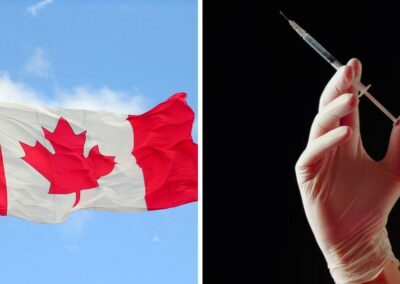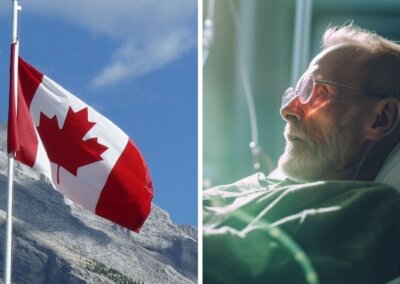An MP in Canada has announced a campaign to prevent assisted suicide and euthanasia being permitted on the grounds of mental illness alone.
Euthanasia was first legalised in Canada in 2016. In December 2022, the Government announced their plan to introduce legislation enabling assisted suicide and euthanasia for those whose sole underlying medical condition is a mental illness. This legislation was introduced in 2023, and the law was expected to come into force in March 2024.
The introduction of this legislation was subsequently delayed after Mark Holland, who was the Canadian Health Minister at the time, announced that “the system is at this time not ready” to make euthanasia and assisted suicide legal on the grounds of mental illness alone. Legislation was introduced in February 2024 so that euthanasia and assisted suicide would become legal on the grounds of mental health alone in March 2027.
However, Andrew Lawton, a Canadian Conservative MP, has now launched a campaign to prevent this legislation from becoming law. Announcing the new campaign, Lawton said “I almost died by suicide fifteen years ago while battling depression. If the expansion of [medical assistance in dying] coming into force in 2027 were in place then, I’d likely be dead right now. Today, I’m launching the #IGotBetter campaign to keep hope alive for people living with mental illness”.
The “I Got Better” campaign is aimed at “showing how the desire to end your life because of mental illness doesn’t have to be permanent. It’s possible for people to heal and to flourish, but not if we give up on them”.
Lawton is urging Canadians who have experienced mental health struggles and “got better” to share “stories of hope and recovery” with him, or to post on social media, using the hashtag #IGotBetter. He said “My goal with the ‘I Got Better’ campaign is to really put my own story out there and encourage other Canadians to do the same. And I want Canadians to be reaching out to their Members of Parliament”.
The “I Got Better” campaign is in support of Bill C-218, which Lawton referred to as ‘The Right to Recover Act’, a Private Member’s Bill proposed by Conservative MP Tamara Jansen and seconded by Lawton. If passed, the Bill “will amend the Criminal Code to permanently stop the scheduled 2027 expansion of medical assistance in dying (MAiD) solely for mental illness”.
“Mental illness is treatable, and recovery is possible”
Introducing the Bill in June, Jansen referred to proposals to include people accessing the country’s euthanasia and assisted suicide programme on the grounds of mental illness alone as “abandonment”, saying “The message the government is sending is that struggling Canadians, trauma survivors and those battling depression, schizophrenia or PTSD are being told that death is a solution we are now willing to offer in response to a life of suffering, often compounded by harm this very society has caused them”.
“That is not health care. That is not compassion. It is abandonment. Mental illness is treatable, and recovery is possible, but only if we show up and help. Canadians are watching. They need us to stand up for life, dignity and hope”.
Jansen added “Imagine that someone’s son or daughter has been battling depression for some time after losing their job or maybe due to a broken relationship. Imagine they feel a loss so deep that they are convinced the world would be better off without them. Now imagine this. Starting in March 2027, under Canadian law, they could walk into a doctor’s office and ask them to end their life. Under our law, the system could legally do just that”.
Canadian veterans offered euthanasia
In 2022, a Canadian Forces veteran was offered euthanasia from a Government department responsible for pensions, benefits and services for war veterans after he contacted them for help with post-traumatic stress disorder (PTSD).
The unnamed veteran reached out to Veterans Affairs Canada (VAC) seeking treatment for PTSD and a serious back injury last month. However, the veteran was left “deeply disturbed” after a VAC employee brought up the possibility of euthanasia or assisted suicide.
Another Canadian Armed Forces veteran, David Baltzer, who served two tours in Afghanistan and also suffered from PTSD, explained how a Veterans Affairs Canada (VAC) agent brought up the topic of “medical-assisted suicide”, saying “I was in my lowest down point, it was just before Christmas”.
“He says to me, ‘I would like to make a suggestion for you. Keep an open mind, think about it, you’ve tried all this and nothing seems to be working, but have you thought about medical-assisted suicide?’”.
“It made me wonder, were they really there to help us, or slowly groom us to say ‘here’s a solution, just kill yourself’”.
Army veteran Kelsi Sheren has been a harsh critic of Canada’s euthanasia laws. Aware of stories of veterans with PTSD who have been pushed to consider euthanasia, Ms Sheren has lambasted her home country’s laws as “disgusting and unacceptable” and has argued that authorities see it as an easier option to euthanise veterans rather than support their recovery.
Ms Sheren shared that she personally knows of nearly a dozen veterans who have been offered euthanasia. She railed against this injustice, saying “When you take people who were willing to put their lives on the line for you, for your safety, then you have the audacity to tell them it’s better if you just die … it is one of the most disgusting things”.
“It’s possible for people to heal and to flourish, but not if we give up on them”
Underlining his message of hope, Lawton explained that “The most important message we can send to those struggling with mental health is that hope is always possible. The ‘I Got Better’ campaign is about showing how the desire to end your life because of mental illness doesn’t have to be permanent. It’s possible for people to heal and to flourish, but not if we give up on them”.
Concerns have been expressed about the expansion of Canada’s euthanasia and assisted suicide programme. As well as legalising euthanasia and assisted suicide on the grounds of mental health alone from March 2027 onwards, a Parliamentary committee in Canada recommended in 2023 that euthanasia be made available for children under certain conditions, and that it be made more easily available for prisoners.
Trudo Lemmens, professor of law at the University of Toronto, who initially supported Canada’s assisted suicide and euthanasia law, also expressed his concerns about expansion, saying “One of the most worrying aspects of the Canadian experiment is it shows that once you start legalising, there is a risk that a significant number of physicians normalise this practice”.
“It’s like putting fuel on the fire. I’m not sure it can be easily contained”.
Spokesperson for Right To Life UK, Catherine Robinson, said “It is deeply disturbing that, if assistance in suicide and euthanasia on the grounds of mental health alone is introduced, people with mental illnesses in Canada risk being abandoned. Canadian MPs should support Andrew Lawton’s ‘I Got Better’ campaign and Tamara Jansen’s vital Private Member’s Bill so that it will not be possible to access euthanasia and assisted suicide on the grounds of mental health alone in March 2027”.
“The expansion of the law in Canada should serve as an important lesson for our MPs and peers as they consider Kim Leadbeater’s assisted suicide Bill. As the Canadian experience shows, what is presented as a limited law with tight safeguards can rapidly expand, and we would be naive to think the same thing cannot happen here”.











